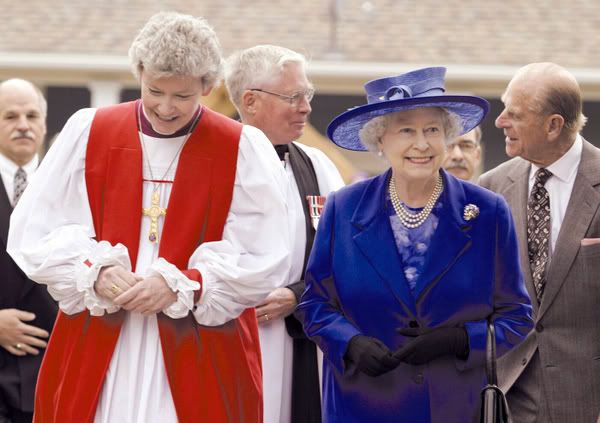 Goodness the news Reports all over the place. Things are reaching a fever like pitch as to the Pope Benedict's thoughts , plan, etc because of the huge Anglcian Conference of Bishops meeting that is about to start. In fact I was reading the Telegraph and read two stories that were 180 degrees apart as to what the Vatican is doing.
Goodness the news Reports all over the place. Things are reaching a fever like pitch as to the Pope Benedict's thoughts , plan, etc because of the huge Anglcian Conference of Bishops meeting that is about to start. In fact I was reading the Telegraph and read two stories that were 180 degrees apart as to what the Vatican is doing.
Two of the best reads are Father's Z's What is Pope Benedict thinking about Anglicans? . Also read Standing on My Head piece B16 Rides in to the Rescue!
Let me add something. When Pope Benedict came to the United states he said something that caught some attention at the ECUMENICAL PRAYER SERVICE in New York
Too often those who are not Christians, as they observe the splintering of Christian communities, are understandably confused about the Gospel message itself. Fundamental Christian beliefs and practices are sometimes changed within communities by so-called “prophetic actions” that are based on a hermeneutic not always consonant with the datum of Scripture and Tradition. Communities consequently give up the attempt to act as a unified body, choosing instead to function according to the idea of “local options”. Somewhere in this process the need for diachronic koinonia – communion with the Church in every age – is lost, just at the time when the world is losing its bearings and needs a persuasive common witness to the saving power of the Gospel (cf. Rom 1:18-23).
Faced with these difficulties, we must first recall that the unity of the Church flows from the perfect oneness of the triune God. In John’s Gospel, we are told that Jesus prayed to his Father that his disciples might be one, “just as you are in me and I am in you” (Jn 17:21). This passage reflects the unwavering conviction of the early Christian community that its unity was both caused by, and is reflective of, the unity of the Father, Son, and Holy Spirit. This, in turn, suggests that the internal cohesion of believers was based on the sound integrity of their doctrinal confession (cf. 1 Tim 1:3-11). Throughout the New Testament, we find that the Apostles were repeatedly called to give an account for their faith to both Gentiles (cf. Acts 17:16-34) and Jews (cf. Acts 4:5-22; 5:27-42).
The core of their argument was always the historical fact of Jesus’ bodily resurrection from the tomb (Acts 2:24, 32; 3:15; 4:10; 5:30; 10:40; 13:30). The ultimate effectiveness of their preaching did not depend on “lofty words” or “human wisdom” (1 Cor 2:13), but rather on the work of the Spirit (Eph 3:5) who confirmed the authoritative witness of the Apostles (cf. 1 Cor 15:1-11). The nucleus of Paul’s preaching and that of the early Church was none other than Jesus Christ, and “him crucified” (1 Cor 2:2). But this proclamation had to be guaranteed by the purity of normative doctrine expressed in creedal formulae – symbola – which articulated the essence of the Christian faith and constituted the foundation for the unity of the baptized (cf. 1 Cor 15:3-5; Gal 1:6-9; Unitatis Redintegratio, 2).
Many Catholic and indeed many Anglicans thought that perhaps Benedict besides sending a major broad truth here was perhaps sending a message to the Elephant literally in the room that is the American Episcopalian Church that has caused some of this crisis.
I think the above plays into his thinking too.















2 comments:
Oh it's giving me a head-ache!
I have be meaning to see what you have been saying about it. THe British Press has been covering it but I can't make heads or tails if anyone knows what the truth is
Post a Comment